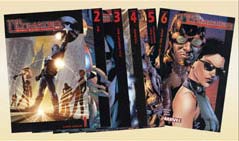 |
 |
 |
|

|
Waiting For Tommy XXIV
By
Richard Johnston
Interview with Bill Jemas |
Bill
Jemas is President of Marvel Comics. Alongside Joe Quesada and
Jimmy Palmiotti, he is one of the main architects for what is
often called New Marvel. A hands-on executive, his credit on
the book is no formality and he's been known to get his hands
very dirty - and I don't mean from eating trifle.
Bill Jemas has been the slipperiest interview subject yet
in this Waiting For Tommy series of eight interviews. While
the likes of Rob Liefeld, Grant Morrison and Mark Millar were
happy to tackle a number of thorny issues head on, Bill was
more ticklish. Sometimes I think I got a grip, most of the
time I didn't. I hope you enjoy this exercise in jelly wrestling.
I don't think I won.
RICHARD JOHNSTON: Bill, you're an experienced businessman,
and have proven your success in a number of fields, turning
businesses around in a short period of time and pulling out
the profits. The problem some see, when this is applied to
the comics medium, is that suddenly you're dealing with an
artform. An entertainment company with a pop cultural history
that's influenced the world - and continues to do so. And
so decisions that might make short term business sense by
increasing profits may have the danger of not only harming
the long term future of Marvel and the Marvel characters,
but of the artform and the cultural impact it makes. Is that
a possibility you can recognize, and does it affect the decisions
you make as President?
BILL JEMAS: You mean like Joe's the creator, Bill's
the suit?
Actually, all of my experience has been in sports and entertainment
and all of the development/turn around work has revolved around
creative development.
At the NBA, I ran a number of related divisions - book/magazine
publishing; trading cards; our photo and footage archives,
and home video. The businesses worked because we captured
the heart and soul of the game in words and pictures and then
published and produce books, card, videos and other products
that NBA fans loved.
That's the Marvel story, job one has been to fix the creative,
and I do that in a very, very hands on way. If you look Marvel's
top selling graphic novels - they are all called Ultimate
- except for the one called Origin. My priority has been to
lead the creative teams who are putting out wonderful work
for Marvel readers.

THE
ULTIMATES #1 - #6 SIGNED COLLECTION - SIGNED VERSION
|
RICHARD: Okay then, plugging aside, do you see
a distinction between sporting reportage and a recognised
artform?
BILL: Never did any sports reportage.
But the skill that goes into managing sports videos
and books are similar to those that go into managing
a great comic book publishing business. And, creative
is about creativity -- regardless of the medium. |
RICHARD: I stressed your business acumen and suitability
before. You've been in the job for a few years now - do you
care about the comics medium or the Marvel characters you
publish at any emotional level?
BILL: I love this game.
RICHARD: Yeah, but are you excited and drawn in any
way to a story told by static juxtaposed words and pictures
over other media? Have you ever pretended to be Wolverine?
Have you ever tried to spin webs? Ever worked out just where
Iron Man's boot blasters would be under your heel?
BILL: Yes, absolutely is that you have to be all
wet to write Namor; you have to swim with the fishes.
RICHARD: Oh like I wanted that image. Okay, wet for
Namor, fine. Which brings me neatly onto another topic. Previous
iterations of Marvel characters have been all-ages - through
the decades that was a matter of form. While the characters
and stories may have had some appeal for older teenagers,
college students, even your actual grown-ups, they were all
suitable for the youngest as well. That changed - not just
when you were at Marvel, but recent changes under your watch
and seemingly at your behest have been the most prominent
of those changes. Is there not something perverse about this?
Taking a character intended for kids and telling stories that
are no longer as suitable for them or even make sense to them?
This wouldn't be tolerated elsewhere - Asterix and Obelix
don't have sex, Charlie Brown does not have a crack habit,
Archie doesn't frequent prostitutes, Pokemon aren't announcing
their sexuality, why is this tolerated for Marvels characters
now in a way that never was before? If an adult audience can't
accept that an intended childhood character shouldn't stay
that way, shouldn't the reader grow up and move on rather
than the character?
BILL: You know about the five blind men in a room
with an elephant - one touches the leg and says it's a tree
trunk another grabs the tail and thinks he has a snake. Marvel
makes books for young readers - they are called Ultimates.
We make books for mature readers, they are called Max. Our
job is to capture the heart and soul of Marvel characters
and writer books that fans will love.
Continued
here...
 |
 |
 |
 |
|
|
|

